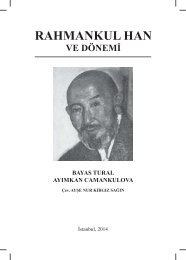THE SOVIET HISTORIOGRAPHY AND THE QUESTION OF KAZAKHSTAN’S HISTORY
SOVYET-TARIH-YAZICILIGI-ENG
SOVYET-TARIH-YAZICILIGI-ENG
Create successful ePaper yourself
Turn your PDF publications into a flip-book with our unique Google optimized e-Paper software.
<strong>THE</strong> <strong>QUESTION</strong> <strong>OF</strong> <strong>KAZAKHSTAN’S</strong> <strong>HISTORY</strong> 133<br />
<strong>THE</strong> ROLE <strong>OF</strong> ERMUKHAN BEKMAKHANOV IN<br />
<strong>THE</strong> TRANSITION PROCESS FROM KAZAKH <strong>SOVIET</strong><br />
<strong>HISTORIOGRAPHY</strong> TO KAZAKH NATIONAL<br />
<strong>HISTORIOGRAPHY</strong><br />
Asst. Prof. Dr. Meryem Hakim *<br />
Soviet historiography is not a new subject for many of the academics<br />
in the world. Nevertheless, the newly independent states began<br />
to deal with the area more often since the Soviet demise. The case of<br />
Ermukhan Bekmakhanov, which is the theme of this conference, began<br />
to be studied first by the native Kazak historians and articles began<br />
to appear in international publications, recently. 231 History writing, and<br />
lifetime consequential struggle of Ermukhan Bekmakhanov who studied<br />
a native liberation movement dating back to the imperial era from the<br />
Soviet history perspective is a prime example that we deal in today’s<br />
conference. Right after the declaration of Kazak independence, elder<br />
generation of Kazaks, who were students of Bekmakhanov, instilled<br />
his struggle into Kazak national sentiment of the new generation of<br />
intellectuals by publishing his famous work of history in the Kazak<br />
language in 1994. Some two decades after that publication, the commemoration<br />
of Bekmakhanov is now taking place in this gathering.<br />
The main purpose of Soviet historiography was the acknowledgement<br />
of the Bolshevik Revolution and the victory of communist<br />
ideology. Under such circumstances, the so-called ‘peoples’ heroes’<br />
of the imperial era and their struggle began to be regarded as positive<br />
issues. Historians of the Soviet period interpreted the past events<br />
according to the approved viewpoint of the central administration<br />
regardless of their wish to reflect the reality.<br />
Our subject of discussion is the example of the research and study<br />
of the Soviet undertaking and interpreting an imperial historical event<br />
from the ideological standpoint of the Soviet era. Consequently, the<br />
difference in historiographic approach between the Bolshevik Soviet<br />
and Stalinist era appear clearly.<br />
Many of the historically forbidden themes in Kazak history began to<br />
*<br />
Konya Necmettin Erbakan University-Department of International Relations<br />
231 Yilmaz, Harun. “History Writing as Agitation and Propaganda: The Kazak History Book<br />
of 1943,” Central Asian Survey, Vol.31, No.4(2012). Harun Yilmaz, “Soviet Construction of<br />
Kazak Batyrs,” in Social and Cultural Change in Central Asia: The Soviet Legacy, edited by<br />
Sevket Akyildiz and Richard Carlson, New York: Routledge, 2014, pp. 45-62.<br />
*<br />
L. N. Gumilev Eurasian National University



